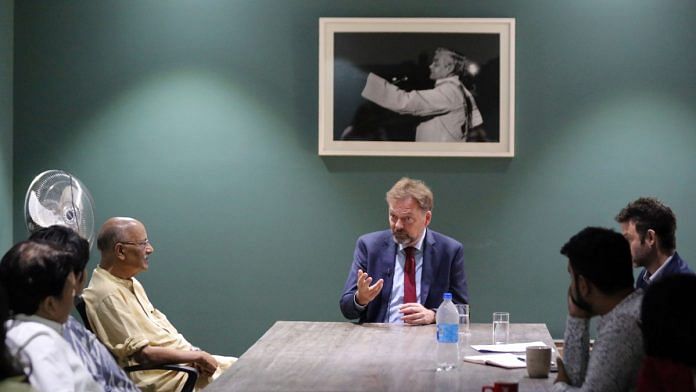New Delhi: Days before the third G20 tourism meet is to be held in Srinagar, Germany has hinted that its delegation will attend the event, which is slated to take place between 22 and 24 May.
“We’re members of G20 and want to support the Indian presidency. The Indian presidency has done an excellent job so far. So, why should we not go to Srinagar?” said Philipp Ackermann, the German Ambassador to India.
India has been facing criticism from multiple quarters over its decision to hold the G20 meet in Jammu and Kashmir — the first major international event to be held there since the abrogation of Article 370 on 5 August, 2019.
UN special rapporteur on minority issues Fernand de Varennes had stated Monday that India was “seeking to normalise what some have described as a military occupation by instrumentalizing a G20 meeting and portray an international seal of approval”.
Subsequently, India rejected the statement as “baseless and unwarranted” and criticised the UN special rapporteur for acting “irresponsibly to politicise this issue”.
In October last year, German Foreign Minister Annalena Baerbock had called for UN’s engagement “to find peaceful solutions” vis-a-vis the “situation of Kashmir” during a joint press conference with Pakistani counterpart Bilawal Bhutto Zardari at Bonn.
Her remarks, too, had drawn sharp reactions from the Ministry of External Affairs (MEA), forcing Germany to issue a clarification.
In a roughly hour-long conversation with journalists at ThePrint office in New Delhi, Ackermann spoke about numerous themes including talks on a Free Trade Agreement (FTA) between India and the European Union. He also commented on the Der Spiegel cartoon which was deemed ‘racist’ by many in India, defence deals between the two countries, education-based migration, and India’s exports of refined oil to Europe.
During his interaction with ThePrint, Ackermann noted that the German government aims to focus on four key areas of cooperation with India: geopolitics (especially the ongoing Russia-Ukraine conflict), climate change and sustainable energy, diversification of business avenues and migration.
He also mentioned that more members of the German government have and will visit India in the future, including German Chancellor Olaf Scholz, Foreign Minister Annalena Baerbock and Defence Minister Boris Pistorius, among others. Moreover, Ackermann stated that Germany had “no problems” with refined oil coming to the country through India.
Also Read: Afghan embassy in Delhi becomes battleground for Taliban & previous republic. MEA keeps mum
‘Do not want to isolate China’
The German envoy expressed his support to French President Emmanuel Macron for his efforts to reach out to China, terming his visit to the country along with that of European Commission President Ursula von der Leyen last month “appropriate”.
He also agreed with Macron’s comments on not wanting “to follow in America’s footsteps blindly”.
“The Russia-Ukraine war has shown that Europe needs to be in a better position to defend itself through our own means and not rely on America. We need to become more independent of American defence support,” said Ackermann.
He suggested countries should keep channels and talks with Beijing open owing to China’s role in the international sphere, especially for India and Europe. “Going to China does not mean Europe embraces China entirely. However, we also do not want to isolate China, but rather discuss issues such as Taiwan, human rights with them,” Ackermann added.
He also spoke on China presenting itself as a possible mediator in the Russia-Ukraine war, noting that a more neutral party would be better suited to mediate since Beijing has investments in Ukraine and at the same time, close ties with Russia.
German policy on small arms
Ackermann also discussed issues pertaining to Germany-India defence cooperation, exploring the possibility of a government-to-government trade deal involving submarines as well as small arms.
He emphasised that the joint submarine deal proposed in February, wherein Germany offered to jointly build six conventional submarines worth $5.2 billion, is taking place between ThyssenKrupp Marine Systems and Mazagon Dock Shipbuilders.
He noted that once both companies agree to a deal, the German government will come in to support the same. However, what this support will look like is unclear.
Asked why German defence manufacturer Heckler & Koch was open to supplying small arms to the National Security Guard (NSG) but not the Indian Army, the German ambassador said, “The German government has an extremely restricted policy on small arms. Small arms deals outside of NATO are basically never signed.”
EU-India FTA
On the FTA between India and the EU, he noted that there was progress in the last round of negotiations held in Brussels in March. Talks on an FTA have been ongoing since 2007, except for a brief pause in 2013.
“The EU is a very edgy partner to negotiate. All 27 member states have their priorities and interests in the FTA. Ultimately, we, the EU, want a comprehensive and deep FTA. While there is still a long way to go, I see a new sense of readiness and determination from both parties to come to a conclusion,” the German ambassador said.
Ackermann added that an FTA with India will be a “game changer” for German businesses and will encourage more of them to invest in India.
On Tuesday, Commerce and Industry Minister Piyush Goyal met with Valdis Dombrovskis — the European Commissioner for Trade — in Brussels, on the sidelines of the first ministerial meeting of the EU-India Trade and Technology Council (TTC).
After the meeting, the Ministry of Commerce said in a statement that the two parties have agreed to expedite ongoing FTA negotiations by “finding convergence on all issues after due consideration to mutual sensitivities including on market access for balanced and meaningful outcomes”.
(Edited by Amrtansh Arora)



